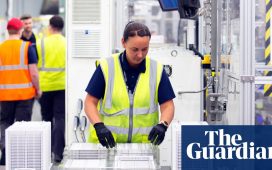She argues Western firms will have to compete on other grounds, such as quality and carbon emissions, to sell at a premium. “This is meant to be about the green revolution, but often the supply chains aren’t as sustainable as you would like. So that’s a hot topic with automakers and is another driver for different sources of supply.”
In Tyneside, one company seeking to do just this is Tees Valley Lithium. From 2026, the company hopes to begin producing lithium hydroxide and carbonate at a refinery near Redcar that will supply UK battery factories.
Paul Atherley, chairman of Alkemy Capital, the company’s parent, says he is “agnostic about the lithium price” to a degree because his company will be seeking to deal with car makers who sell to wealthier customers, not those looking for cheaper, entry level cars.
“We’re targeting that premium market, where anybody who is consumer-facing has to make a value decision about the product and the supply chain that goes into it.
“Customers also want to re-align their supply chains, so they’re not totally dependent on [China].”
Of course, no one is fooling themselves into thinking the West can become totally independent of China, with crashes in the price of cobalt, lithium, nickel and other metals underscoring how hard it will be to break free.
Even on that score, Jervois’s Crocker sounds a positive note. His company is currently working with the Pentagon to expand the size of the US’s mine and open a potential refinery, helping to make the overall proposal more economically viable.
“We don’t need a 90pc market share, just a share that allows the portion of the product that goes into certain industries, which are genuine and critical, not to be cut off in the event of geopolitical unrest,” he adds.
“It’s an insurance policy. And I guess, since Covid and Ukraine, people are starting to realise that insurance policies matter.”
Not all Western miners are falling over in the face of market ructions, however. Just over a fortnight ago, Anglo-Swiss mining giant Glencore, the single largest producer of cobalt, said it would simply batten down the hatches and hang on to supplies for a little longer.
“This is an issue not about demand. This is an issue about supply,” said boss Gary Nagle. “We’d rather hold those stocks and bring them into the market when that supply-demand balance gets back into place.”









